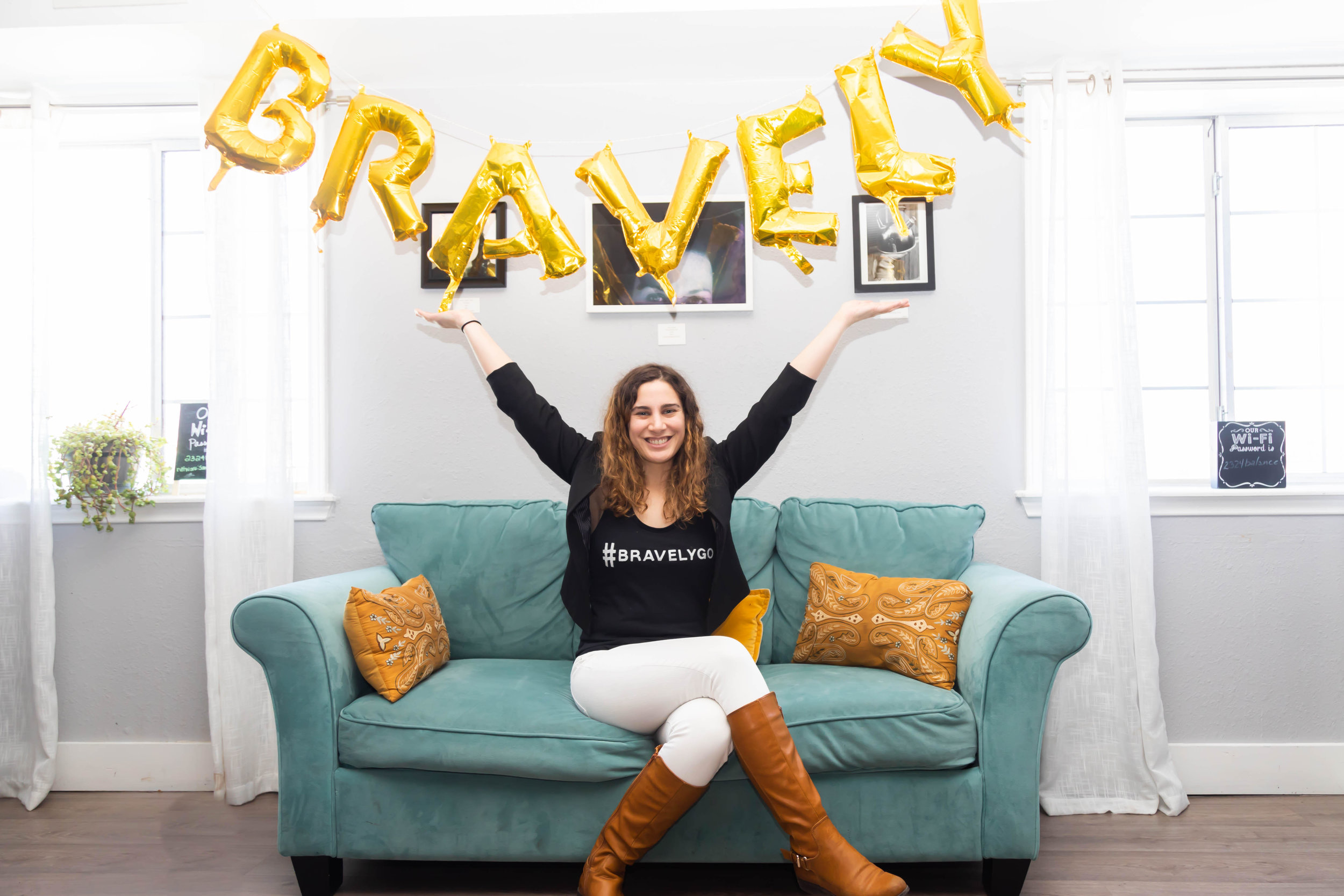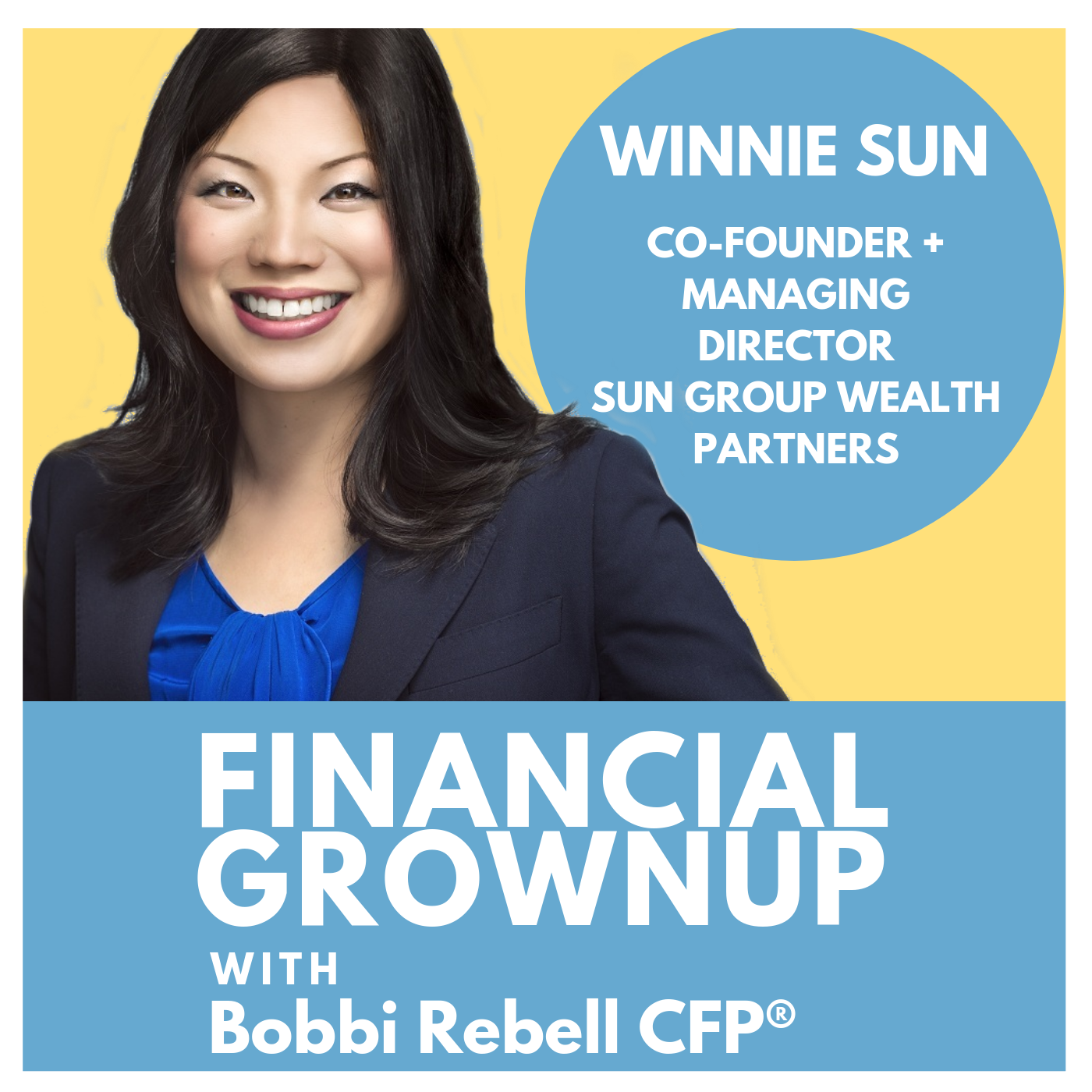The Squid Game is an intense look at the desperate measures people will take to get out of debt. While the story is fiction, the lessons we can take away about class divide, the reckless choices made when in debt, and the way money can reveal someone’s true character, are hitting home with so many of us. ** spoiler alert**
Money Lessons for Grownups from the Netflix series "The Squid Game”
You can’t judge people‘s wealth and success based on appearances.
Money makes us do illogical, and often illegal things.
Manage the pressure otherwise it will consume you.
Betrayal comes from the people you trust the most.
Strength is not always stronger.
Wealthy people can abuse the vulnerability of people who have financial problems.
Follow Neil!
Instagram - @kaufman.neil
Facebook - @neil.kaufman.12
LinkedIn - @neil-kaufman-4847a414
Website - http://www.ey.com/
Follow Bobbi!
Instagram - @bobbirebell1
Twitter- @bobbirebell
LinkedIn- Bobbi Rebell
Website- http://www.bobbirebell.com
Did you enjoy the show? We would love your support!
Leave a review on Apple Podcasts or wherever you listen to podcasts. We love reading what our listeners think of the show!
Subscribe to the podcast, so you never miss an episode.
Share the podcast with your family, friends, and co-workers.
Tag me on Instagram @bobbirebell1 and you’ll automatically be entered to win books by our favorite guests and merch from our Grownup Gear shop.
Full Transcript:
Bobbi Rebell:
I hope you guys are all celebrating some big adulting milestones this season and you know what? Finding the perfect gift for those celebrations can be kind of tough. I have the solution over at grownupgear.com. We have adorable hats, totes, mugs, pillows, Ts and seriously, the most cozy and comfortable sweatshirts.
Bobbi Rebell:
They're all on grownupgear.com and all at affordable prices. We even now have digital gift certificates if you can't decide. Use code grownup for 15% off your first order. Buying from our small business helps to support this free podcast. You know what? We really appreciate it. Thanks, guys.
Bobbi Rebell:
You're listening to Money Tips for Financial Grownups with me, certified financial planner, Bobbi Rebell, author of How to Be a Financial Grownup and you know what? When it comes to money being a grownup is hard but together we've got this.
Bobbi Rebell:
Hey, grownups, welcome back. We are going to do something very special this week, starting with having back my number one, most favorite ever co-host, Mr. Neil Kaufman, aka, my husband. Welcome back, Neil.
Neil Kaufman:
Back on popular demand and for those of you that sent me fan letters, thank you. I appreciate it.
Bobbi Rebell:
Yes, Neil is poised to become a regular co-host on this show. And speaking of regular, a lot of the regular listeners do know that you were featured in our summer watch series where we talked about money related streaming shows and the lessons from them. Well, as of now, we're not going to do a whole series for fall, but there is a show that everyone, including Mr. Neil Kaufman, I should say, everyone is talking about that has some pretty intense money lessons.
Bobbi Rebell:
That show is the Netflix series, the Squid Game. Neil and I have been watching the series. We've already had some pretty intense discussions about it and so of course, I recruited him to come back to the podcast. So Neil, welcome.
Neil Kaufman:
Thank you. We're here to talk about Squid Game, which for those of you that have been I guess living under a rock and don't know about the Squid Game or haven't seen it yet, because it's the most popular show in lots of countries, it's a nine episode series about the lives of 456 people, all who need money.
Neil Kaufman:
They need it for lots of different reasons. They come from all walks of life. Some of drowning in debt, desperate for not being able to pay off their debt. Some people are thugs. Some people are white collar. Some people are just unlucky. But what they all have in common is they need money and they are willing to participate, willingly, they want to participate in this game to try and survive.
Neil Kaufman:
And they've got to play six Korean children's games where if you're the winner you're going to get a large sum of money, $46 billion Won, which is $38 million U.S. dollars. It's a high stakes game.
Bobbi Rebell:
It's a lot of money. Okay. So I want to make sure everybody knows that we have watched all of the episodes and we are not going to be able to remember what to say and what not to say so there will be spoilers. So this is your cue, if we've interested you in watching the Squid Game and you haven't watched it yet, pause. Go watch it. It's nine episodes.
Bobbi Rebell:
So for most people they could binge it in a day or two. For me, because I fall asleep during everything, it took a little bit longer but Neil was patient. Go watch the Squid Game and then come back right here. This is where the spoilers are going to start. Starting with the fact that the main character is presented as sympathetic but a lot of eye rolls.
Bobbi Rebell:
I mean, he's massively in debt. He gambles away money that his mom ... By the way, he's 40 something and living with his mom, speaking of not being a financial grownup, of course. He's asking her for more money to buy his daughter a birthday present. He gambles it.
Bobbi Rebell:
All kinds of things happen but just the characters, it's not like they're all that sympathetic. A lot of them are basically making big money mistakes on their own and trying to find get rich quick schemes to begin with. Right, Neil?
Neil Kaufman:
He's a likable guy but he's a schlump. It's just the guy, he does everything wrong. He's divorced. He's a gambler. I mean, he's got all the classic tell-tale signs of just being a not responsible person, both financially and emotionally. I mean, he doesn't even maintain a decent relationship with his daughter. I mean, or his mother.
Neil Kaufman:
Yes, he lives with his mom and we've heard that story all too often but he betrayed his mom. He canceled the insurance, her health insurance, which no shock there, an aging woman, she needed the insurance.
Bobbi Rebell:
Yeah, that's another big spoiler. It comes up later. The other spoiler is that he wins money gambling. Okay, so now in theory you would think he would use this money that's he's gambled ... he wins on this horse betting, which is another thing that comes up. They're betting on horses. Is it different to bet on horses than humans? Think about that, everyone that's seen the show.
Bobbi Rebell:
But, he wins a huge amount of money and instead of using it to pay off his debt he starts gambling away with it again. He doesn't pay off the debt that owes. He gives a big tip to the person in the window and he wants to go shopping and buy extravagant things for his daughter that he's promising her all this stuff.
Bobbi Rebell:
Even when he gets her a present he does it through a gambling game, a children's game where he picks a present, which later on ... We don't have to spoil this but let's just say it's not a child appropriate gift that he ends up getting her and it's really just the ultimate symbol that this guy just can do no right and he's his own worst enemy really.
Bobbi Rebell:
So, Neil, we've set up the premise, we've got this guy, fast forward a little bit. He runs into someone who's effectively a salesman who convinces him to go into this game and he meets a van, gets gassed so he doesn't know where he's going. And he ends up in a dorm with 455 other people who are competing in this contest and basically they say that anyone that is not eliminated at the end of six children's games will win a huge prize of money. As you mentioned, the equivalent of $38 million. But there's more to it.
Neil Kaufman:
Yeah. So they're playing these games but they don't realize it until they get into the first game, what it's really all about. So the idea is some people win the game, some people lose the game. If you lose, by the rules that are put in place, you are effectively eliminated from the game. And elimination means death.
Bobbi Rebell:
Right. And note, for the very first game they don't know that. They just know you're eliminated and they assume, I think understandably, that they would just go home. It becomes clear very quickly and it's a very gory scene that being eliminated is death.
Bobbi Rebell:
So after that, through a little TMI, we won't get into it. The players do choose to go home. They end the game and they play one game and by going home they have forfeited the opportunity to win the money and they go back to their dreary lives. And we talked about the main character but many of the other characters have very unfortunate situations with money.
Bobbi Rebell:
They're all desperate for money, to either save face. There's an immigrant theme here, to get their relatives out of North Korea, into Korea, to feed their families. To pay off gambling debts. All kinds of different reasons why people need the money. As Neil mentioned, white collar crime and so on.
Bobbi Rebell:
They go back to their lives. What's shocking to me is that of the people that go back to their lives and have the opportunity to not die in pursuit of this money, 87% of them choose voluntarily to participate in a life or death game where it's pretty logical that most of the people are not going home with the millions of dollars.
Neil Kaufman:
I think it really shows the desperation. So they went into the game originally knowing or not really knowing that much about it but after they realize that it was a fight to the death and they would actually potentially sacrifice their life and they go back home.
Neil Kaufman:
They willingly reenter it a second time, knowing what the consequences of their actions are. It may cost them everything but they're so desperate they'll still go ahead and play the game. 87% of them come back, which is really ... it just ... it boggles the mind.
Bobbi Rebell:
It is shocking and it also is shocking how the characters evolve through this process because they're in this bubble and they're not in contact with the real world any more. They're just in this world where they're surrounded by their ... in some cases they try to form teams and this and that but who's on your team can be very confusing. And it's confusing to know who to trust. And that's something that also goes to the theme of money, right, Neil?
Neil Kaufman:
It's really interesting. I'll tell you, choosing who's on your team, who's not on your team, I mean, I thought there was a part of the show where they were choosing teams for tug-of-war and nobody, nobody wanted to choose either the women or the old man to be on their team.
Bobbi Rebell:
Wait, but spoiler, we didn't know it was tug-of-war when they were choosing. They did not know what the game was. There was a presumption that strength mattered.
Neil Kaufman:
There was. There was a presumption.
Bobbi Rebell:
Which is also a real world perception very often that the strong men were the most desirable teammates. That was the perception, which is often the perception in real life too.
Neil Kaufman:
Yeah, no doubt. No doubt. And shock, maybe not shock, the team with the three women and the one old man, won the tug-of-war game against the men's ... the all men's team. Not so much for any other reason than it was the wisdom of the old man. He had life experience. He had some knowledge that he brought to the table.
Neil Kaufman:
And there was also the women in terms of how they all worked together as one cohesive team. So it was the mind that won over the power of many on the other side. It was a David and Goliath story and I love that but the point is, you've got to think broadly, have a different perspective. It's not always the obvious answer that wins.
Bobbi Rebell:
Another thing that's also interesting is that there might be a perception that everyone in this dorm, everyone playing this game was poor, maybe because they were born that way or just things beyond their control. But one of the characters that you found most interesting was character 218.
Bobbi Rebell:
He is someone that was the pride and joy of his neighborhood. We see scenes of his mother bragging about how successful he is. The main character knew him as a child and he was the big success of the neighborhood. He was working in finance but in fact, he had lost his investor's money and he still was in the outside world portraying this veneer of huge success. Nobody knew that he had had this huge financial ruin.
Bobbi Rebell:
And that's something that really resonated because very often people appear to have so much money and so much success in life but underneath there's nothing and sometimes there's less than nothing. And it's not always clear but there's a lot of reason to believe that this very wealthy appearing guy had maybe committed some crimes and really betrayed his investors. He was a bad guy.
Neil Kaufman:
I hate that guy. I mean, I got to tell you, even the way it wrapped up with him in the end and I'll get to that in a second. But I think it speaks to, I mean this guy had a pedigree education. He had the pedigree job. I think the lesson in that is don't judge people's wealth or success based on appearance only.
Neil Kaufman:
I guess it almost goes to what we're talking about these days around mental health issues. People that you think are okay, maybe they're not okay. Maybe they're not doing great. It's like that Instagram moment. It looks great from the outside in but the inside out is just terrible.
Neil Kaufman:
I think the life lesson here is the person who said that it's better to look good than to feel good, that person is wrong. The person that said clothes makes the man. That guy is also wrong. It's mental health. It's inner beauty. It's health. It's relationships that matter, not what your neighbors think, not what the valet who parks your car thinks or the stranger who sees on the street wearing whatever you're wearing.
Neil Kaufman:
You need to define a level of success by, I guess I want to say pay it forward. By the good words and things that you do and the impact that you make on others. It's those things that matter.
Bobbi Rebell:
Yeah. This show also makes some big picture statements about the growing gap between the uber wealthy and the poorer people in society and the things that the wealthy do. About two-thirds through the show, the series, we learn that this is a game that wealthy people are staging for their own amusement and it's compared by many people to things like Battle Royale and the Hunger Games.
Bobbi Rebell:
You have a lot to say about this. I mean, they come in, it's wealthy people really abusing the lower classes here who have financial problems instead of helping them. It's very cynical.
Neil Kaufman:
It's interesting. So wealthy people can abuse the vulnerable who have financial problems. No shocker there. I guess it's the theme for the decade. People hurting people who are already hurting, instead of lifting those people up in reality as opposed to the appearance of reality.
Neil Kaufman:
In the end what I liked was I think the last lesson of the show was that humanity wins. It's best to be your best. It's the best lesson so far in the show, which is sometimes people in power, people who seem to be doing good are not always doing good.
Bobbi Rebell:
And it's also interesting though, it makes a little ... well, a big statement. The main character early in the show is betting on horses. Later in the show the wealthy VIPs are betting on the contestants in this game. Is it saying maybe that are the wealthy and the poor doing the same human behavior? Is it just our human instinct to do this kind of cruel game?
Bobbi Rebell:
Obviously, the horses, I sure hope are alive afterwards, unlike the people but they're setting them up similar because the VIPs are very much gambling on the humans in this game. They are making bets and they're enjoying it and it seems like there's some parallels that the filmmaker or the series maker is trying to make there.
Neil Kaufman:
They're talking about objectification of both men, of women. They're talking about the abuse of power. I mean, it's a real statement that they're making here in terms of who's good, who's bad and sometimes who's good and who's bad is just a matter of perception.
Neil Kaufman:
So to your point, people betting on humans versus people betting on horses, is there a differentiation between them? I don't know but there's so many lessons in this story. I don't even know where ... there's so much. I read so much online about it and what I thought was interesting is how characters changed in the story too.
Neil Kaufman:
Like 67, I forget what her name is. I'm just going to refer to the characters by their numbers. It's easier. But 67, she started off as a hard character. She became a soft character in the end. It gives me pause to think about how people fall into two categories sometimes.
Neil Kaufman:
When people are put to pressure some people are like bits of carbon. You know what I mean by that? You put enough pressure on somebody and some people, like a bit of carbon, you put enough pressure on them and they turn into a diamond. They really shine like 67. She was playing marbles and her opponent gave up her life for her, which I thought was a selfless act.
Neil Kaufman:
It was amazing. She literally sacrificed her and not only was that an amazing act of selflessness but it rubbed off on 67. That's what I'm saying with that whole pay it forward thing. She became a better person for it and she did pay it forward, by the way, because in the middle of the night when she was hurting and there was an opportunity for 456 to kill 218 in his sleep, she paid it forward and she course corrected 456.
Neil Kaufman:
She brought him back on the tracks. She gave him ethics, gave him values again, which I thought was amazing as opposed to the character 218. So my whole other viewpoint is some people are like bits of carbon that you can turn into diamonds and some people fracture and crack under pressure.
Neil Kaufman:
This guy, 218, I was really disappointed in this guy. He manipulated Ali, number 199, played upon his naivete, tricking him into losing his life. He also betrayed all of the players in the beginning when he basically he knew the game, the honeycomb game, and he wouldn't share his knowledge with anybody else. He just looked out for himself only and I get it.
Neil Kaufman:
It's a game to the death but it was to the point where this person fractured so much from the pressure that not only did he betray all of his friends and then betray Ali and then he betrayed everybody at some point in the games. And he even slit 67's neck in the sleep. She was already dying and he killed her. What's the point in that?
Neil Kaufman:
In the end, his self-sacrifice, I got to tell you, it left me hollow inside. Hollow gesture from a dying man and he didn't even do it to give to 456 to win. He did it to give because he wanted the money for his own purpose, which was to share it with his family. So I get it but I'm telling you, it's a whole microscope of life on the two different types of people there, those that are good and those that are evil.
Bobbi Rebell:
I think the lasting image, because we need to wrap up in a minute. The lasting image for me is the final character, which is throughout the show, the series, they have this giant piggy bank hanging above the dorm that every time someone else dies the remaining players see more money coming in to this giant glass piggy bank above them.
Bobbi Rebell:
So it's like they're being driven by this character of this piggy bank that they can never stop thinking about it and how that will solve their problems, make their life better but in the end, as we know, it doesn't. It really doesn't and that's, I guess, the final spoiler, really. That the money doesn't change anything for the winner.
Neil Kaufman:
I got to tell you, there was one theme in there that really resonated with me on a personal level because I have seen this person in every company I've ever worked with. Betrayal doesn't come from people more often than it comes from people that you trust most. Sometimes your friends are really frenemies. I love that word, frenemy because you got to find out who your frenemies are sometimes.
Neil Kaufman:
Fake friends like Deok-su, number 101 and Han Mi, number 212. They were friends. They were friends but when 101 left 212 scorned by not picking her for ... we talked about the tug-of-war, didn't pick her. He didn't realize that 212 would ultimately be the death of him. So he burned bridges with her and she wound up throwing him off the bridge, which is kind of funny. It took him to his death.
Neil Kaufman:
So my lesson out of that was the kindness you show to others will always find a way of coming back to you or maybe karma is going to sting you for being ruthless in the end and that's what happened to 101.
Bobbi Rebell:
So on point, Neil. You're brilliant, what can I say. All right. Final thoughts.
Neil Kaufman:
I'm thinking that there's going to be a second season, the way they left it at the end there. He didn't get on the plane, 456 did not get on the plane to visit his daughter. He let me down again. He turned around and I think it's a hat tip to a potential season two.
Bobbi Rebell:
Yeah. I think so too. I mean, the rumor is and we're just laying down all these spoilers here but the rumor is that a season two might focus more on the VIPs and the police and the people behind the game and what's going on behind the scenes because they show us a little bit but I definitely want to know more about how this came about and what's going on.
Bobbi Rebell:
And we've got the brother, the police officer and that whole thing. So I would love to hear more about that and I'd love to see more about what ... I'm going to research more about what's been going on in terms of class divide in South Korea. I think that's really interesting and something we can talk about in our own country as well.
Bobbi Rebell:
So final, final words, Neil.
Neil Kaufman:
Tune into the podcast. Listen on Spotify. Tell us what you liked, what you didn't like. I'd love to hear from you.
Bobbi Rebell:
We love that. All right. And everyone, you can follow me and support the show on Instagram @bobbirebell1, on Twitter @bobbirebell. Let us know what you thought about it. Let us know if you want to hear more from Neil and more of our money related content reviews. I don't know what we want to call it, a synopsis, whatever. But be in touch and thank you for being financial grownups.
Bobbi Rebell:
Money Tips For Financial Grownups is a production of BRK Media LLC. Editing and production by Steve Stewart. Guest coordination, content creation, social media support and show notes by Ashley Wall. You can find the podcast show notes which include links to resources mentioned in the show as well as show transcripts by going to my website, bobbirebell.com.
Bobbi Rebell:
You can also find an incredible library of hundreds of previous episodes to help you on your journey as a financial grownup. The podcast and tons of complimentary resources associated with the podcast is brought to you for free but I need to have your support in return. Here's how you can do that.
Bobbi Rebell:
First, connect with me on social media @bobbirebell1 on Instagram and bobbirebell on both Twitter and on Clubhouse, where you can join my Money Tips For Grownups Club. Second, share this podcast on social media and tag me so I can thank you. You can also leave a review on Apple Podcast. Reading each one means the world to me. And you know what? It really motivates others to subscribe.
Bobbi Rebell:
You can also support our merchant shop, grownupgear.com by picking up fun gifts for your grownup friends and treating yourself as well. And most of all, help your friends on their journey to being financial grownups by encouraging them to subscribe to the podcast. Together we got this.
Bobbi Rebell:
Thank you for your time and for the kind words so many of you send my way. See you next time and thank you for supporting Money Tips For Financial Grownups.
Neil Kaufman:
(Singing)









































